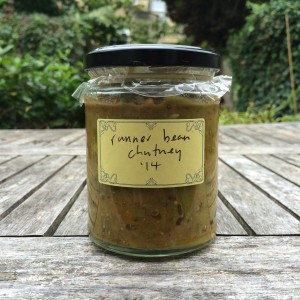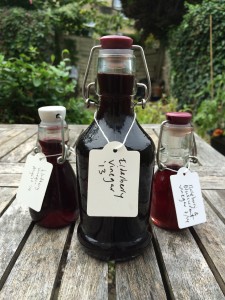Chutneys are a great way to combine wild food with home grown produce. Every Autumn I have a huge surplus of runner beans and this is how I put them to good use:
Runner-bean chutney
Makes 5 medium sized jars.
- Three cornered garlic bulbs 25-30
- Malt vinegar 150ml
- Allspice berries 9
- Coriander seeds 1 tsp
- Garlic Mustard seeds 2 tsp
- Runner beans 750g
- English mustard powder 1 tbsp
- Wholegrain mustard 2 tsp
- Turmeric 2 tsp
- Cider vinegar 150ml
- Organic cane sugar 200g
- Salt 1 heaped tsp
- Tomatoes 300g
- Cornflour 30g
Peel and halve the three cornered garlic bulbs, put them into a medium-sized saucepan with the malt vinegar, coriander and Garlic Mustard seeds. Bring to the boil then lower the heat and simmer for 8 minutes.
String the beans, removing the stalks. Thinly slice each bean, cutting diagonally to give fine shreds about 4 or 5cm long. Bring a pan of water to the boil, add the beans and cook for a full minute. Drain and set aside.
Mix the mustards, turmeric, sugar, salt and half the cider vinegar in a small basin. Dice the tomatoes then add to the saucepan with the vinegar and garlic bulbs, stir in the beans and mustard mixture then add the remaining cider vinegar. Bring to the boil, then simmer for 15 minutes, stirring regularly. The beans should be tender but don’t overcook – remember they will soften in the jars.
Remove a few spoonfuls of liquid and use it to mix the cornflour to a paste. Stir gently back into the beans. Leave to simmer for a minute or two until the mixture has thickened slightly. Ladle into warm, sterilised preserving jars and seal.
You could substitute the Garlic Mustard seeds for bought yellow mustard seeds as it is too late to forage your own seeds at this point in the year – I collect them during mid-late Summer and store for later use.
Three Cornered Garlic bulbs can be found all year round but you could use shallots or onions instead.


